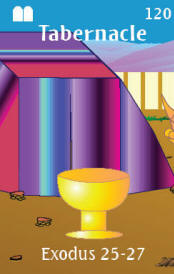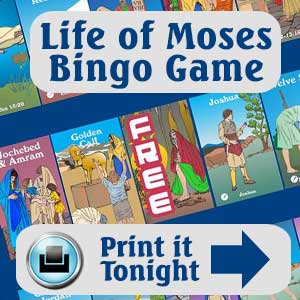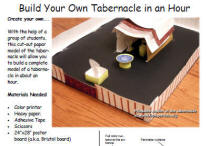Tabernacle

Free-
Print Bible cards for
review, as incentives and rewards. Or
purchase
pre-printed Bible cards.
Search CBD
The Tabernacle
Vocabulary
-
- Tabernacle: tent of meeting
- Sacrifice: giving something up that has value to you
God wanted to live amongst the people he had saved from Egypt. But of course for the God of all creation to live with a wandering tribe of people took some special consideration. God instructed Moses to build a tent, so His dwelling would be mobile. He also instructed Moses to have the people camp around this special tent, called a Tabernacle, so that His presence would be at the center of their lives.
God instructed that the Levites, or family of priests, would divide up the responsibility for the various sections of the Tabernacle. But while God wanted to live with His people, He had to provide some kind of separation between Him and them. His powerful glory had scared the Israelites, and was dangerous to approach. Also, the daily life of the Israelites included sin and transgression, which had to be atoned for before they could be in God's presence.
The Tabernacle, then, provided a way for god and his people to dwell together, and served to prepare God's people for a time when God could cleanse his people fully and live in their hearts (today!).
The walls surrounding the tabernacle separated the area where sacrifices to God took place from the rest of the camp. A tent covering the holy place separated the area where the priests were able to go, and the holy of holies was for the very presence of God, where the high priest could go once a year, as long as he brought sacrifices for the sins of the people.
 Discussion point: The Tabernacle was a place of many
sacrifices. Some were simple offerings of flour and oil. Others
required that innocent animals give their life. Part of the purpose
of all this sacrifice was to make it obvious how serious and
dividing sin was in the relationship between God and His people.
Then, with the giving of one sacrifice, Jesus on the cross, all the
other sacrifices stopped. They were no longer needed, because the
one truly priceless sacrifice had been made. Discuss how blessed we
are to live in a time when Christ is our sacrifice. How different
would our worship be if we had to constantly bring animals to die
for our sins? Are our sins still as serious? What made Christ
sufficient for all our sins?
Discussion point: The Tabernacle was a place of many
sacrifices. Some were simple offerings of flour and oil. Others
required that innocent animals give their life. Part of the purpose
of all this sacrifice was to make it obvious how serious and
dividing sin was in the relationship between God and His people.
Then, with the giving of one sacrifice, Jesus on the cross, all the
other sacrifices stopped. They were no longer needed, because the
one truly priceless sacrifice had been made. Discuss how blessed we
are to live in a time when Christ is our sacrifice. How different
would our worship be if we had to constantly bring animals to die
for our sins? Are our sins still as serious? What made Christ
sufficient for all our sins?Activity: Draw a simple set of concentric boxes or circles. Label the innermost, holy of holies; next the holy place; then the tabernacle walls; and then the camp. Use removable stickers or dots to fill in the circle with relative amounts of people allowed in each circle. Many in the camp. Fewer making sacrifices in the walls of the tabernacle compound, even fewer in the holy place, and one in the holy of holies. Now make another set of two circles, one inside the other: the church, and the world. Show that while there are many dots in the world, there are still many dots in the church, and any dot in the world can move into the church at will.
Craft/Activity: String a line across the room and drape an opaque cloth over it - a thick one if you have it. Tell students that on the other side of the cloth is the Holy of Holies. Make the high priest's breastplate out of kraft paper, coloring twelve stones on the front and using yarn to string it over the student. Designate one student at a time to be the high priest and to go behind the cloth, wearing the breastplate.

Printable 3D Tabernacle
Print out this awesome pdf, cut out the pieces, and you can build your own paper 3D Tabernacle in a very short period of time. Thanks so much to www.gospelhall.org/sundayschool for sharing this awesome resource.
True or False
1. Anyone could enter the Tabernacle to talk to God. F (only priests)
2. The High Priest could enter the Holy of Holies any time he needed to ask for help on behalf of the Israelites. F (only once a year)
3. God taught the goldsmiths what they needed to know to create the furniture in the tabernacle. T
4. The Levites were responsible for setting up and transporting the tabernacle from place to place. T
5. The Tabernacle was set outside the camp, away from where the people lived. F (It was in the center.)
Memory Work:
Exodus 25:8 "Then have them make a sanctuary for me, and I will dwell among them."Review Questions for gameboard
 |
linguistic questions |
|
|
 |
activity questions |
|
|
 |
emotion questions |
|
|
 |
application questions |
|
|
 |
fact questions |
|
|
 |
review questions |
|